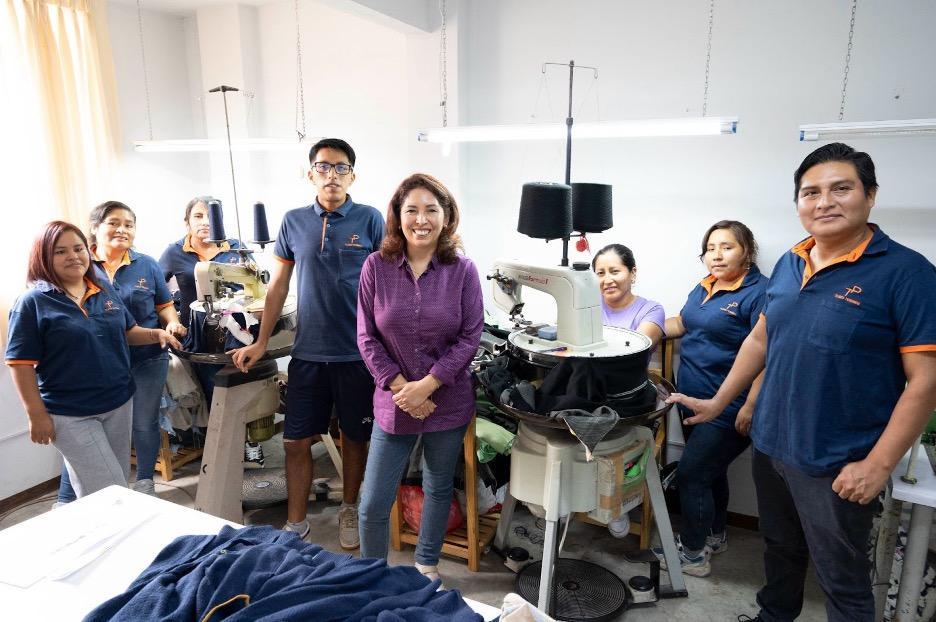How a Women-Led Textile Business Is Weaving a Lasting Legacy in Peru

Violeta Pacheco’s clothing company, Tejidos Peruanos, is based in the Lima neighborhood of Villa El Salvador, home to some of Lima’s poorest residents.
Despite the area’s poverty, Villa El Salvador is known for being a place where women have built the support structures to collectively care for each other and their neighbors: small businesses, soup kitchens, and schools.
Walking among the hillside concrete houses of the neighborhood, visitors can’t help but take note of the people’s brightly colored, fine clothing and blankets — the traditional textiles of Peru, world-renowned with iconic Indigenous patterns.
Violeta’s story of building her own textile business here is interwoven with the history of this place, where women help women succeed, and what seems impossible can be accomplished as a community.
The first sewing machine — and the first loan
Eighteen years ago, Violeta’s business started with one, solitary Singer sewing machine.
In Peru, it’s common for banks to require men as co-signers on loans, even loans for women-owned businesses. Fortunately, Violeta’s husband, Pedro, trusted her vision and took out not only the first loan, but each subsequent loan.
“From the first moment we bought the first machine, he said, ‘Have this, love, here you go, I trust you,’” Violeta says.
She calls him her strategic partner and her “angel.”
Adding new machines one at a time, while training women to operate them, Violeta’s vision grew from reselling pre-made garments to making her own. Throughout the growth of her business, she needed Pedro to believe in her enough to take out new loans and continue to invest in the growth of her business, a situation that many women in Peru do not have.
Without a banking history, as a woman entrepreneur, it would have been impossible for Violeta to get the loans that made her business possible.
This is exactly what CARE’s programming has set out to change. If policymakers prioritized investments in women’s economic power, the global economy could grow by an additional 7 percent, or $10 trillion, by 2030.
Which is why, over the past five years, CARE’s partnership with the Mastercard Center for Inclusive Growth has supported more than 150,000 entrepreneurs worldwide with loans, critical support services, and training.
The Ignite program specifically has already unlocked $154.9 million in loans from an initial grant of $5.26 million. The results have been astonishing. 79 percent of female program participants increased their sales, and 89 percent reported an increased confidence in running the business.
As Violeta’s business grew, she and Pedro expanded to new floors of their house, until they outgrew it entirely.
Violeta chose to expand her business because she wanted to help other women who shared her vision to succeed and knew she could offer them critical jobs.
But once again, she needed Pedro to sign the mortgage for the building she chose.
“Now we have three floors,” she says. “With separate areas [for each stage of garment making]. We are 14 people, 12 of us are women, who assemble, weave, finish, check, and iron each sweater.”
“Tejidos Peruanos is the dream of 14 women”
Financial access isn’t the only barrier Violeta has faced.
“I entered this world that was predominantly led by men: all weavers, workshops, led by men,” she says.
“They said, when I knocked on the door, they said, ‘Where is your teacher? Where is your husband?’ That was frustrating, because I was the one leading the team. When I bought material they would say, ‘Are you going to be able to carry that?’ Maybe I couldn’t carry it but I could direct someone to do it, and make the decisions.”
Partnerships and programs that offer training, skills, and networks to women entrepreneurs are opportunities for women like Violeta to gain the financial knowledge and confidence to access credit to grow their enterprises.
In the past two years, Violeta’s dream has grown even more, and she has established her own brand: Maywa, which is the Quechua word for “Violet.”
Through Ignite, Violeta and others received entrepreneurial and business training, and with her new skills, she was able to tell a richer story about the sustainable practices of her company.
“I would tell all women not to be afraid. That sixth sense that women have never fails us."
Violeta Pachecho
Peruvian small business owner
Now, thanks to the training she’s received, Violeta and her team were able to refine their pitches to international clients, photograph their products, use digital tools, and build a catalog, bringing her closer to her dream of a successful international brand.
“We didn’t know that what we were doing could be interesting and would add to our proposal,” she said.
And just this year, she hit a major milestone: she was able to take out the first loan in her own name.
“Today it is me, Violeta Pacheco, who can access a loan in the bank… that’s important because it allows us to make decisions without fear of making mistakes, because we felt supported as a family.”
Asked what advice she would give other women starting out in business, Violeta says:
“I would tell all women not to be afraid.
“That sixth sense that women have never fails us. Women on their own face many obstacles. However, if we build a community of the people who inspire us and support us, we can achieve so much. We can become vessels of knowledge and can pour that experience into other women who are just beginning. We can do things together that we could never accomplish alone.”
The CARE Women’s Economic Justice team recently launched Strive Women together with Mastercard Center for Inclusive Growth, to build on the success of the Ignite programming. Strive Women supports women entrepreneurs to feel confident, resilient, in control, and equipped to grow their businesses, so they gain economic power in their households, communities, and economies.

